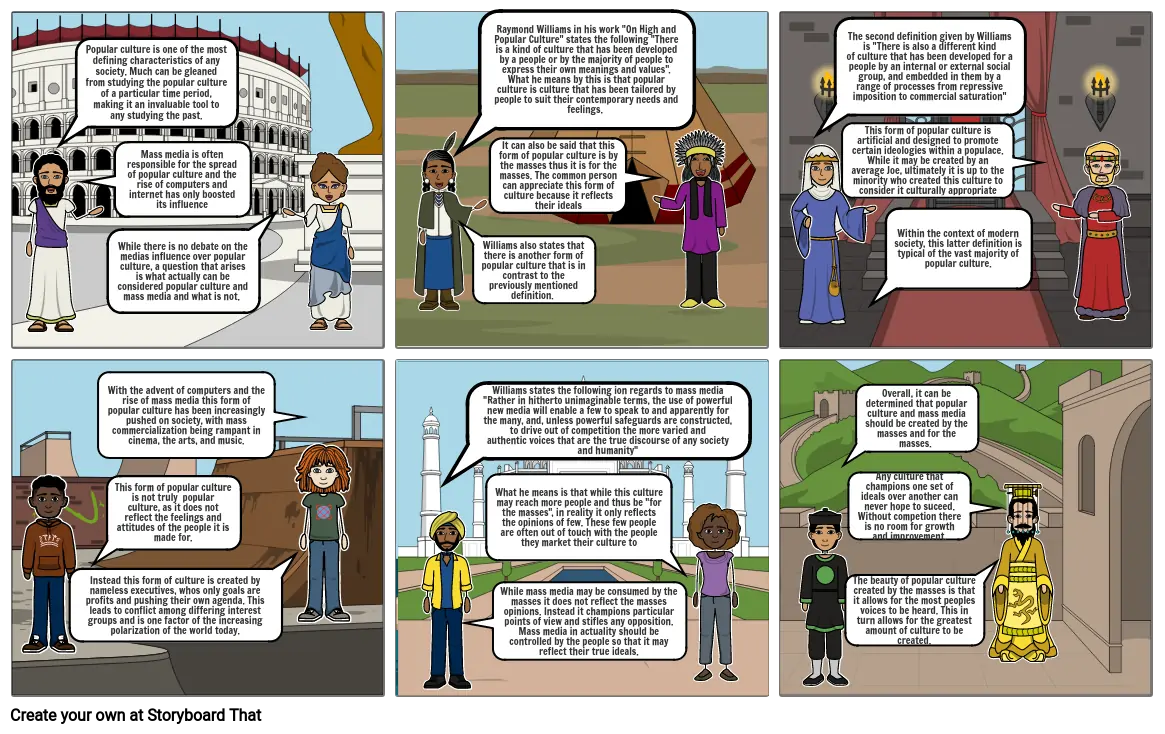What is mass media and popular culture

Storyboard Description
SOC 211 Assignment 1
Storyboard Text
- Popular culture is one of the most defining characteristics of any society. Much can be gleaned from studying the popular culture of a particular time period, making it an invaluable tool to any studying the past.
- Mass media is often responsible for the spread of popular culture and the rise of computers and internet has only boosted its influence
- While there is no debate on the medias influence over popular culture, a question that arises is what actually can be considered popular culture and mass media and what is not.
- Raymond Williams in his work "On High and Popular Culture" states the following "There is a kind of culture that has been developed by a people or by the majority of people to express their own meanings and values". What he means by this is that popular culture is culture that has been tailored by people to suit their contemporary needs and feelings.
- Williams also states that there is another form of popular culture that is in contrast to the previously mentioned definition.
- It can also be said that this form of popular culture is by the masses thus it is for the masses. The common person can appreciate this form of culture because it reflects their ideals
- The second definition given by Williams is "There is also a different kind of culture that has been developed for a people by an internal or external social group, and embedded in them by a range of processes from repressive imposition to commercial saturation"
- Within the context of modern society, this latter definition is typical of the vast majority of popular culture.
- This form of popular culture is artificial and designed to promote certain ideologies within a populace. While it may be created by an average Joe, ultimately it is up to the minority who created this culture to consider it culturally appropriate
- Instead this form of culture is created by nameless executives, whos only goals are profits and pushing their own agenda. This leads to conflict among differing interest groups and is one factor of the increasing polarization of the world today.
- This form of popular culture is not truly popular culture, as it does not reflect the feelings and attitudes of the people it is made for.
- With the advent of computers and the rise of mass media this form of popular culture has been increasingly pushed on society, with mass commercialization being rampant in cinema, the arts, and music.
- Williams states the following ion regards to mass media "Rather in hitherto unimaginable terms, the use of powerful new media will enable a few to speak to and apparently for the many, and, unless powerful safeguards are constructed, to drive out of competition the more varied and authentic voices that are the true discourse of any society and humanity"
- While mass media may be consumed by the masses it does not reflect the masses opinions. Instead it champions particular points of view and stifles any opposition. Mass media in actuality should be controlled by the people so that it may reflect their true ideals.
- What he means is that while this culture may reach more people and thus be "for the masses", in reality it only reflects the opinions of few. These few people are often out of touch with the people they market their culture to
- Overall, it can be determined that popular culture and mass media should be created by the masses and for the masses.
- The beauty of popular culture created by the masses is that it allows for the most peoples voices to be heard. This in turn allows for the greatest amount of culture to be created.
- Any culture that champions one set of ideals over another can never hope to suceed. Without competion there is no room for growth and improvement.
Over 30 Million Storyboards Created

